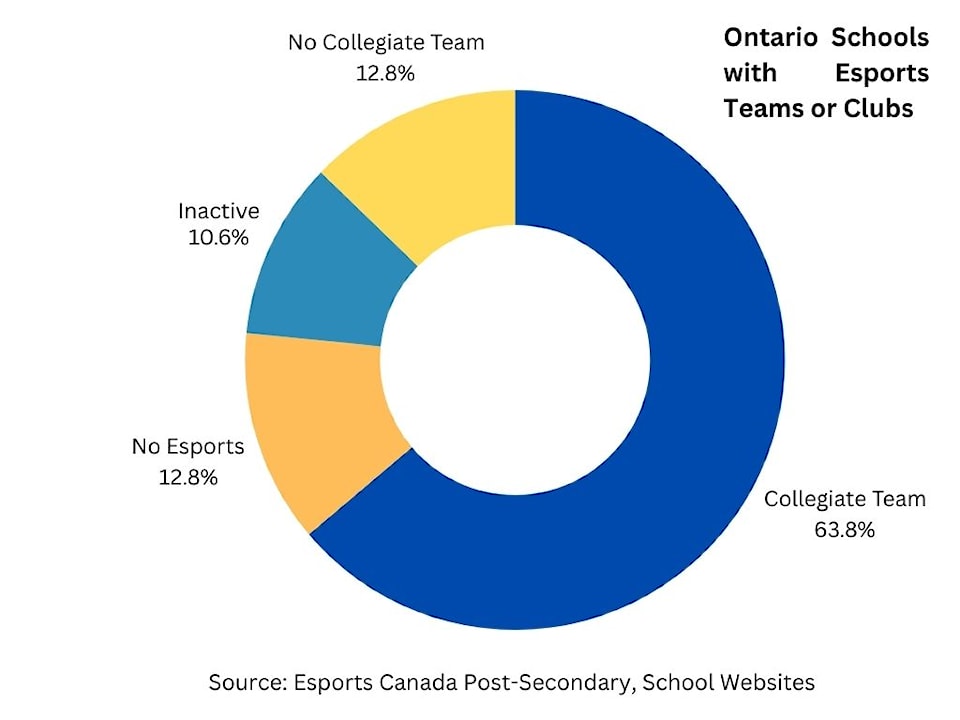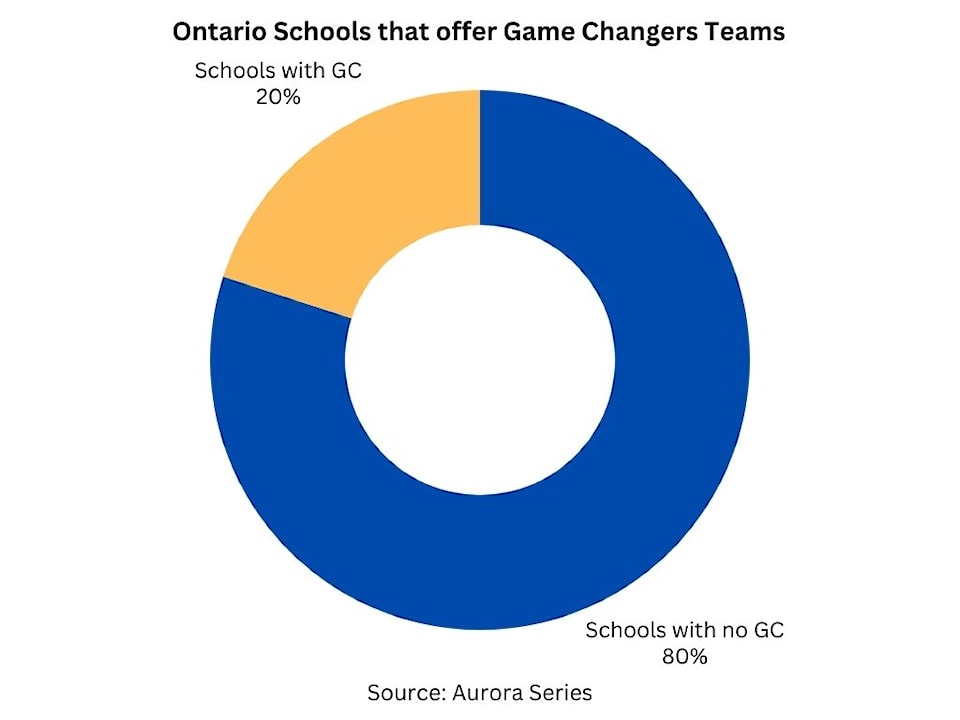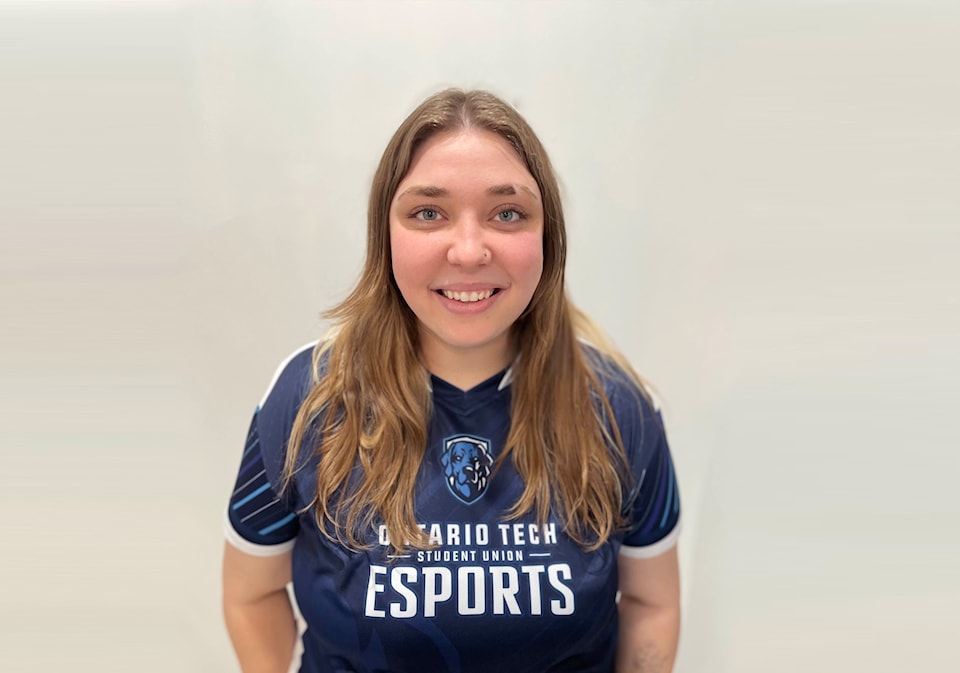When Caitlyn “CaitlynGG” Groff was first approached about joining Ontario Tech Student Union’s inclusive esports team, she accepted without hesitation.
Although OTSU offered a varsity team for Valorant, a game changers (GC) team was different. It’s a team solely for women and marginalized genders and it was more appealing than the typical predominantly male varsity teams.
“I felt like it would be a more friendly market. It’s a place where I can actually meet more friends rather than just game with them, [compared to] joining the regular Valorant team with a bunch of dudes, that wasn’t for me,” Groff said.
First developed in 2023, OTSU’s Purple Team is one of the few GC teams that exists within the collegiate esports space.
Ontario has 23 public universities and 24 public colleges. Of the 47 schools, only 36 have an esports club or varsity team supported by the schools.

Based on information from past Esports Canada games, a not-for-profit national competitive esports organization, and respective school websites, 63.8 per cent of schools that offer an esports club also offer a varsity team.
Despite this, the number of GC teams offered within the collegiate space is slim.

Aurora Series is the only GC collegiate competition offered in North America. Past competitors highlight the Ontario schools that support collegiate GC teams.
Of the 30 schools that offer varsity esports teams, only 20 per cent have a GC team.
Some schools, such as Humber’s Esports Program, allow everyone to play together. For instance, this year’s roster includes Humber’s first female player in Valorant, Tia Kelsey.
Simply introducing women into male-dominated spaces, however, is not enough. The second-year esthetician student said it feels more empowering to play with a team of like-minded individuals.
“We understand each other, we know how shitty the game can be to us and how sexist people naturally are,” Kelsey said. “It’s amazing. It feels like making a difference just doing that.”
Groff said the treatment of marginalized genders within these spaces shows why GC teams are necessary.
Groff said when playing games with other people, people of marginalized genders are treated negatively in games by “toxic teammates.”
“If you’re performing badly due to your toxic teammates, they’re not going to see you as a proper player,” Groff said, “I don’t have the same opportunity to rank up as other people do because I’m a woman.”
Groff said people’s attitudes towards GC teams are often negative as well, with the Purple Team’s male counterparts often getting more opportunities in the spotlight.
“[The male varsity team] gets more time on streams, they get more overall promotion, and the GC team is kind of swept under the rug,” Groff said.
Instances of women not being taken seriously are reasons why people such as Queenie “sriracha” Chen, past player and OTSU’s Purple Team administrator, want people to pay attention to OTSU’s GC team.
“Nobody really takes the GC team seriously, even though they should,” Chen said. “I definitely see a lot of potential [in our players] that people choose to ignore just because we’re females.”
Despite these challenges, GC outside of the collegiate sphere has been gaining more attention within the mainstream esports sphere.
Riot Games Inc., developers of Valorant, holds a global Game Changers tournament annually. The VALORANT Game Changers Championship was held earlier this month in Berlin, and the American Canadian GC team, Shopify Rebellion (SR) won.
People were paying attention not just because of the team’s success, but also the success of one of the players.
Professional esports in Valorant are divided into three tiers. Tier 3 consists of collegiate teams and lower-ranked GC teams. Tier 2 consists of higher-ranked collegiate teams, GC teams, and lower-ranked esports teams. Tier 1 consists of higher-ranked franchise players.
After being titled the most valuable player throughout most of the SR’s games in VALORANT Game Changers tournaments in the past two years, Vietnamese Canadian player, Ava “florescent” Eugene was reported to be signing onto a European Tier 1 team.
Eugene is the first woman to advance into the Tier 1 scene of Valorant.
Despite these achievements, Eugene still faced discriminatory statements. Users from VLR.gg, an open-source website that covers Valorant esports stats and news, questioned if Eugene deserved her place as a trans woman.
"There’s a reason no one watches Game Changers, people just don’t want to see men compete in what is supposed to be an all-female tournament, doesn’t matter if you call them a ‘she,’” one user said.
The general public, however, has still been positive. Tier 1 players from the American Valorant team, Sentinels, were quick to say Eugene is a good player.
Fellow SR team member, Melanie “meL” Capone, said there was a positive difference in how marginalized genders are treated in the Valorant scene compared to other games.
“There’s a lot more appreciation for trans individuals,” she said. “I think there’s still a lot of legroom to go through, it’s not perfect. But it’s better and I think we’re on the right track at least.”
Capone said she believes collegiate esports can reach this point, especially with GC teams.
“I think they’re in a good spot. It’ll take time, and something great will come out of it,” she said.




